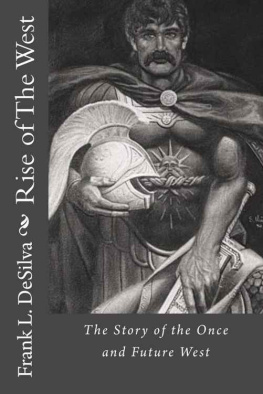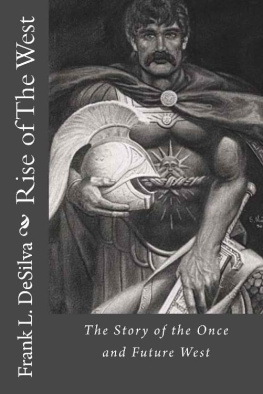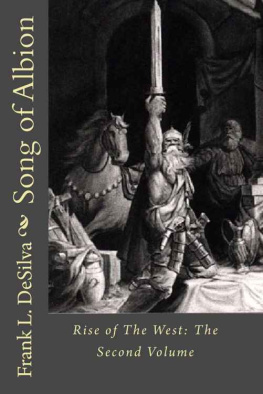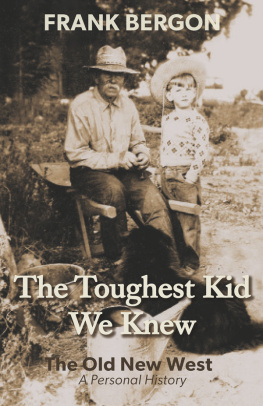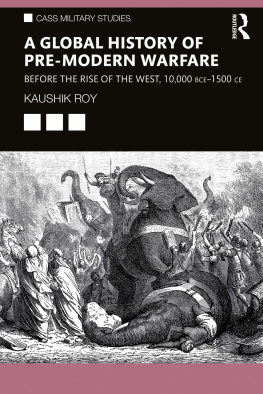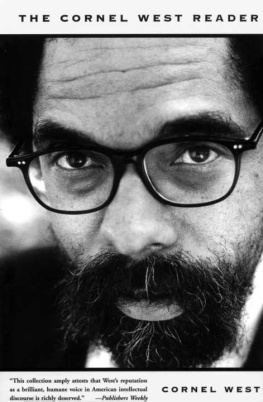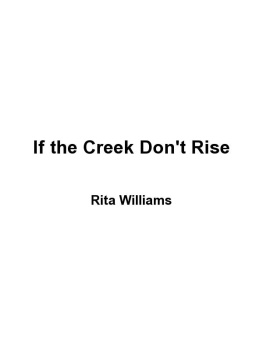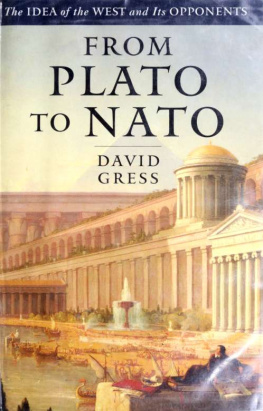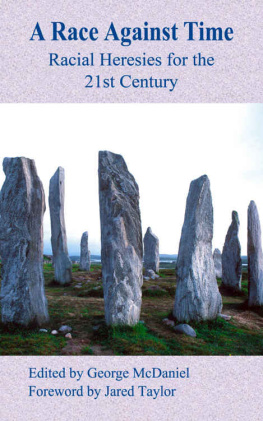Rise of The West
By
Frank L. DeSilva
RISE OF THE WEST
A Study of Race-Culture and HistoryCopyright 2003, 2011 Frank L. DeSilva
ISBN-10: 1461001501ISBN-13: 978-1461001508All rights reservedDedicated to all those who have lived and died,
Who Defend,AndProtect the Soul of the West
CONTENTS
Acknowledgmentsi1Introductionii2Chapter I23Chapter II284Chapter III765Chapter IV1466Chapter V2257Afterword2518Addendum2559Appendices26510Index335
ACKNOWLEDGMENTS
It is not easily admitted as to how many persons actually inspired this work tocome to fruition.This Work was envisioned while on a long journey, and the numerousindividuals who came into my life was myriad.
This work was developed over long years. It came to me in a dark anddangerous world and, was, perhaps, a Light unto myself, making the darkpaths less pressing.
And to that ever-present Muse, whispering softly thanks for being there. i INTRODUCTION
Cause and effect. Origin and Purpose. Destiny.
These are the actualizations of the consciousness. This is the spirit of Innerman. This is the essence of all that is, of all that has been, and all that is to be(the becoming, in the Nietzschean sense). In this light may one see, as if lookingdown a long, dark tunnel, the past, illuminated by this realization; even as wesee the future, glimmering ahead, beckoning for all to follow or lead: a paththat, one way or another, all must tread. This is Life, the animation of whichwe possess, a gift by which we can better ourselves, our families, our RaceCulture. Thus, as the light of day shines upon us, the Rise of the West beginsits ascent upon the modern age; a recurring motif. To be more specific, we see thatpresence, that essence of spirit, which we call Culture in our Western Civilization begin itsascent as in ages past
The Rise of the West is a metaphor. It is a study, albeit in large partmetaphysical, concerning the metamorphosis of Western culture. We shall cover few known and unknown dates, genealogies, Kings or Empires. Thisseems best left for the 'historian' proper. No, this study is the transvaluation ofhistory - it is the science of, and hence, the study of the 'science of history' asit relates to the continuing evolution of everything Western: its organicconception, its purpose (stated or unstated), its values (religions, mores, etc.,),its past and its present; but more importantly, its future prospects based onwhat has gone before. This requires much study, contemplation, and spiritualguidance.
The historian ponders through enormous amounts of 'facts', facts which mayormaynotbesuch. Hereadsvoluminousstudies, statistics,personalhistories, and their accounts of happenings related to known time and space. Hecomposestreatiseupon treatise, calculationsimmeasurable, andhypothesizes constantly about events and happenings that he regards as vitalto his premise. In this regard, this author is no better or worse than they, those who have gone before. In all due respect however, this science ofhistory is commensurate to traditional or lineal history, perhaps, even morecompelling. It is important for one to understand this perception: It is theanimation of organic thought.
The origin of all history starts with the first thought. This thought wasnothing but the spirit of that present presence, that moment, long ago, whichgrew from incidental happenstance, to the total out-growth of its particularenvironment, its animate being, its soul-culture. From the daily routines ofCro-Magnon man and their complexities, to the complex Industrial age of our'present presence', we remain, constant, fixed to a landscape, a territory; a definable place we call our own: A place where all our future happenings will occur,occupying a place also, in history. Unspoken, this origin draws attention to usonly in the dim recesses of the primitive race-soul, disclosing yet anotherconstant: that being, the long extended chronology of souls behind us. Those, whichgave us Life. Man, Western man, must understand this link with himself if heis to comprehend his actual presence in a world of externals [materialsubstance] and thoughts [spirit].
This is the whole history of Western man. That of his great will-to-express hisenvironment, his feelings, his dreams, and his inner being: that of himself. Thishas been his consuming fire. Every mark he has left, monuments, languages,writing, all have been an expression of higher-culture never fully attained;seemingly just beyond his reach. He has molded his environment like no other culture. Through his machines, he has conquered, at last, his naturalelements, thereby making slaves out of ancient masters.*Nevertheless, hisbattles are legion, and it is his lot in life to struggle daily. His toil brings himrest.
He dreams.
His thoughts soar ever upward to the stars; he touches them. His spirit,seemingly just behind, or in front of him. He grasps it, sideways, but neverfrom its source. He understands the heartbeat of his ancient spirit but,seemingly, can never master it. Himself, he cannot master. Therefore, heseeks a method, a formula, and a projection of himself: He creates. As in aWagnerian music score, the leitmotif recurs, always apparent to the searchingeye. The vast structures of his design parade themselves throughout the ages,telling of himself, his spirit, and his continual driving for excellence and
* This only is temporary, and for certain periods of duration. It is only if Natureherself stands to the side, waiting to see how the passion play finds fruition in itsparticular destiny. Nature is the ultimate master in all things, and seeks not the Good or the Bad of a thing, but will bless only those which overcome. FLS
iii
purpose. His language, the parent to most higher cultures, flows as music,lyrically denoting a science in motion. He then, finally, actualizes his innermost spirit through his science of the deed: He writes.
All these things and more belong to Western Man.
What belongsto WesternMan is, externally, an obviouspoint ifthedistinctions between past and present are to be asked: For what is seen can bebelieved. But, what of the unseen? Of Fate? Incident? Destiny? What doesthis culture (as with all higher culture) owe to the intangible? To that psychicpresence that, individually or collectively, affects the existence of its race-soul? Is it mere chance, coincidence, or luck that leads a tribe, a city, or nation toreach its potential unrealized by those that have come before? Are the facts ofhistory simply to be analyzed as events [actualized] that had only tangiblecomponents by which to become? Moreover, just what are the forces behindthe creations of fire, or the wheel, of atomic fusion? What is tangible?Intangible? Is the 'fact' that we see enough? On the other hand, is there adeeper, more spiritual - yes, simpler answer? Let us discover one if we may.
Historians often quote this axiomatic verse: "Those who do not learn fromhistory and its mistakes, are condemned to repeat them." We see, hence, webelieve. Yet, these selfsame historians (and Science too!) cannot or will not,acknowledge what is not seen; the child of the Enlightenment can onlyunderstand the god of Reason. They repeat as if a mantra: "Let me touch thy scars, so that I may believe."
The existence of the intangible is a condemnation of their reality.And so the Tangible.
Of Flesh and bone, of blood, the modern historian would, in all likelihood,answer in this fashion: "What of this? Is not history the sum of its greaterparts? The numbering of facts and figures which measure the course ofevents the more important? And so they repeat.
To Western culture known, and unknown, the body of flesh, blood, and bone has been its only foundation. It is the sum of its soul. This is Race-Culture in the purestsense. It is a biological fact of independent units, individuals, in which its totalsubstance makes up each particular race-culture. Each distinct Race. This isself-evident to any but the Modern. He is blind. Yet, it is precisely thisconstant amalgamation, this conglomerate, which forms the literal body ofeach specific culture. It is this mass, like the individual, which wills itsdirection; it is this organic [will to express] momentum that decides its modesof conduct and attaches itself to known history; it is the link to the past,present, and future. This organism, this whole, is the race-culture of WesternMan.

